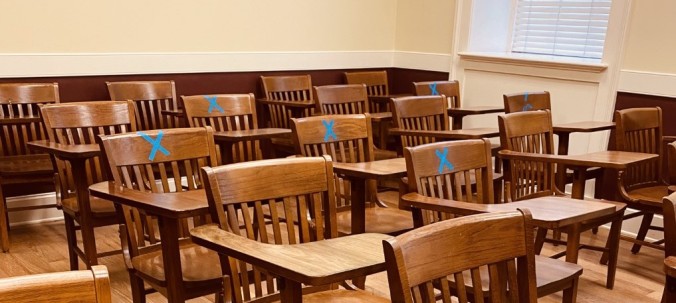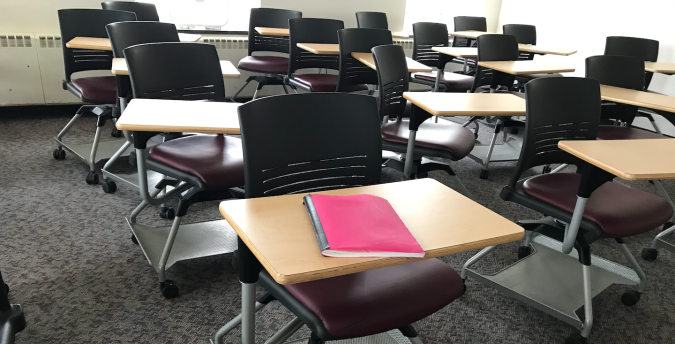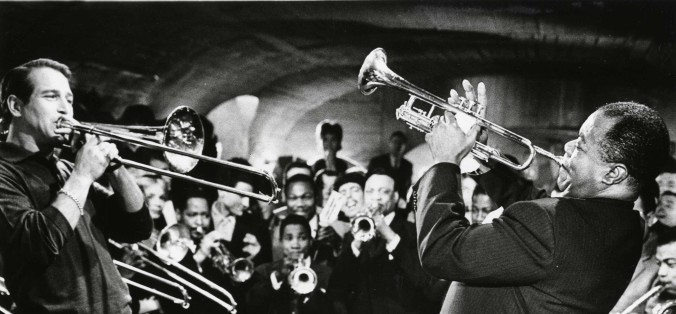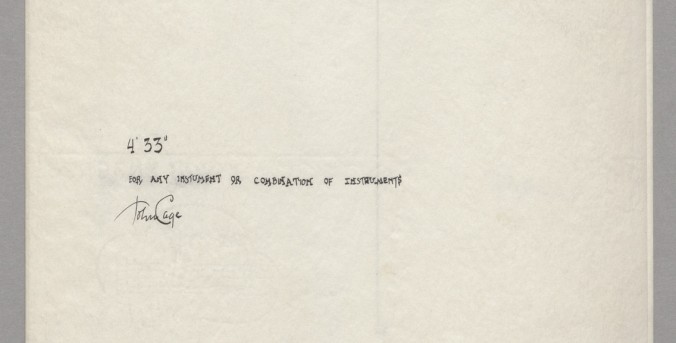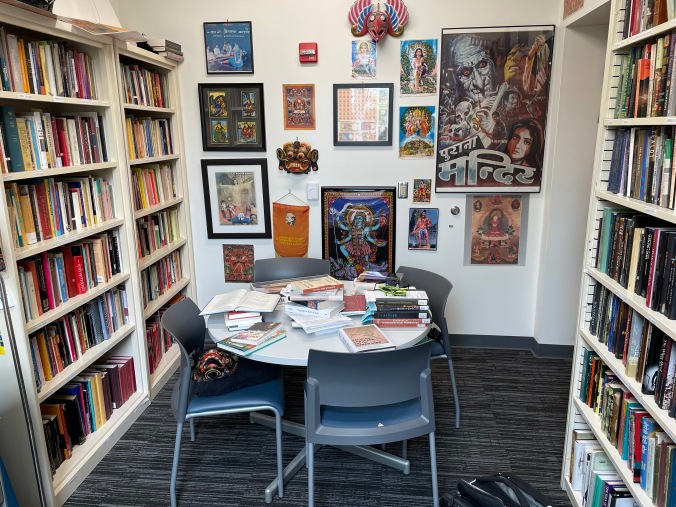Does playing with LEGOs belong in an undergraduate theology classroom? Of course! As Héctor M. Varela Rios of Villanova University contends in this blog post, there is ample space and there are salient lessons to be learned from a classroom session where students get a chance to play.
Transparent Participation
In this second of two blog posts offering techniques for teaching the current and future generations of tertiary-school students—digital natives accustomed to screens and social media—I recommend assessing class participation on the basis of pre-class online discussion posts. Regularly requiring students to consider together how to respond to questions from reading guides prepared particularly for our course encourages these learners to think about our course materials in diverse ways and helps these course participants to begin to approach unfamiliar topics in a supportive yet thought-provoking environment. Shifting the assessment of class participation online enables students contending with physical- or mental-health issues limiting access to in-person class meetings to contribute to our course’s collective inquiry, eases any performance anxieties that all students may feel in our in-person meetings, and ensures that every course enrollee has additional low-stakes opportunities to reflect on our course topics before studying them more formally.
The Joy of Teaching Off Center
In this blog post, Erika Tritle (Coastal Carolina University) compares the art of teaching to the art of modern dancing. In particular, the author describes the ways in which being off balance and letting things nearly fall as they might during the course of a class can be a boon to maintaining a sense of composure throughout the teaching experience.
Reading by Spotlight
This is the first of two blog posts that offer techniques for teaching the current and future generations of tertiary-school students—digital natives accustomed to screens and social media. In this first post, I advocate the introduction of electronic course texts into the pedagogical encounter. Bringing online books into the classroom by projecting them onto a screen, I not only can ensure that my students have access to what we all are reading for our course, but also can encourage them to attend to the details of our texts rather than simply skimming them like most other online materials.
Using Online Case Studies in the Religious Studies Classroom
With a teaching load that demands competence in a broad range of subjects and courses that mostly serve students majoring in something other than religion, I am constantly balancing my own high hopes for what students will gain from each course against the reality of my finite capacity to meet them. I turn with gratitude to academically-sound online resources and make a case in this blog post for using case studies in class.
“I’m not crying, you’re crying”and also Learning: Vulnerability as Pedagogy
In this blog post, Héctor Varela Rios (Villanova University) ponders the value and usefulness of vulnerability in the classroom. The post contends that vulnerability is not only okay, but has salutary praxical dimensions, models plasticity, serves as an equalizing force, and can be taken into consideration in assessments. The deeply personal nature of being vulnerable, however, must be handled with care in the classroom.
Reconnecting
. . . I think the seeds of a career in teaching were planted that day. So was a very particular sense of wonder and a lifelong love of learning. . . . One day, I found myself facing a room of first-year college students who were looking up at me, waiting to hear what I had to say. Could I tap back into that sense of wonder, that love of learning that made me want to spend my whole life in the classroom in the first place and maybe even pass it on, just a little bit? These were the kinds of questions I had been thinking about when, on the first day of classes this spring, I asked my students about times they’d experienced joy in their learning.
Remote Learning Hangover
We keep asking ourselves, “When will things get back to normal?” or “Will they ever be the way they were?” As my colleagues and I plod through the last week of classes in spring semester ’22, we begin to wonder what we can do to get back to some semblance of normal. In some ways, this semester has been more difficult than the previous COVID semesters.... Teaching methods and strategies don’t seem to be able to budge this malaise. As a colleague put it to me recently, stuff that’s worked year after year falls flat this semester. I know it isn’t just at my university; I’m reading and hearing about this from colleagues at my institution and others.
Do-Be-Do-Be-Do: On the Phenomenology of Teaching
What is the phenomenon of teaching? What would it mean to describe it, to inhabit that interactive space?... What follows is an attempt to explain what I understand to be in play as I teach. This is an aspirational essay to be sure. For one thing, everything works well in this rendition. Things don’t fall apart like they usually do in practice, though I would also argue that the improvisation generated by such failures contributes moreover to the terms of this phenomenon. Nevertheless, I submit this example as a model for what I think I’m doing, for what might yet be; at least part of it pertains in every iteration of its performance, making this singular example a composite of when things go well.
“Opinions Can Be Wrong!” and Other Things I’ve Learned to Tell My Students
Student misinformation is a perennial problem. I find it best to deal with misinformation as quickly and with as little embarrassment for students as possible.... The idea is to move students through their assumptions, rather than going around them or working against them. Having become familiar with these misunderstandings, I find that surfacing and contextualizing them early in the course prevents later problems. And I’m transparent about my goals with students, explaining that having uncomfortable early conversations will improve their future work. It helps to explain what not to do. So, here’s a list of things I say before first papers in lower-level courses:...
Rediscovering Joy
I have been thinking about what the craft of teaching will look and feel like in a context where the atmosphere for learning is so uncertain, and both teachers and learners are so drained. ...what would a more joyful classroom look like? The possibility of experiencing joy in learning feels really important right now, both for the students and for me. I don’t feel like the students are as likely to feel joy, though, if I’m not feeling it, and I’m not likely to feel it if I’m not connecting to the material. I won’t be able to connect to the material if I’m not teaching a syllabus that seems manageable and — dare I say it? — fun.
Silence
My first university teaching experience outside of Swift Hall was an adjunct gig in the suburbs while finishing the dissertation. In addition to the requisite anxieties that attend stepping into the classroom—especially doing so as a novice—a particular doubt arose in anticipation of each class meeting: Could I sustain a semester-long conversation with my students? If not, how would I fill this silence?
Teaching the “Nones”
By Kathleen Self The irreligiosity of my students is reflected in the comment I hear at least once a year from one of the “nones,” a comment that begins with some formulation of “Because we are not religious any more…”… What this room full of “nones” has in common is a low level of religious literacy.… I’ve had to find ways to prompt them to tell me what their religious knowledge is or isn’t. Yet some students do show up interested in religion, having learned little bits here and there – mostly, I’ve found, from entertainment media.
From the Bible to Bioethics: Teaching as the Only Faculty in a Field
By Ellen Haskell How do you decide what courses to offer when you are the only faculty teaching in your field? What do you do when prerequisites are impractical, but every course can’t be an introduction? Which interventions move students through prior assumptions to clear the path for learning and exchange? My posts will reflect on the experience of teaching a minority religious tradition at a large state school without a Religious Studies graduate program. Part 1 addresses course planning and community; Part 2 will discuss teaching strategies and experiences.
Camino as Classroom: Rethinking the Study Abroad of Religion
By Liz Bucar Experiential learning has always been central to the pedagogical identity of my current employer—Northeastern University. We are best known for our robust Co-op program, which lets students apply classroom learning in a work environment, but we also offer global experiential opportunities that allow three thousand of our students go abroad each year. … Continue reading Camino as Classroom: Rethinking the Study Abroad of Religion
A Semester at the Newberry Library
By Meira Z. Kensky One of the coolest and best teaching experiences I’ve had so far was co-directing the Associated Colleges of the Midwest’s Newberry Seminar in the Humanities. Many small liberal arts colleges are members of a consortium, a collection of colleges that pools resources to offer programs to faculty and students. Coe, alongside … Continue reading A Semester at the Newberry Library
Experiments in Social Learning
By Cass Fisher Like most people who apply to and complete graduate school, my academic life was shaped by excellent teachers and mentors. Until it was my turn to stand behind the podium, I never gave much thought to what made my professors such effective educators. I assumed that all good teaching required was disciplinary … Continue reading Experiments in Social Learning
Teaching Religion and Sexuality Respectfully: Can We Do Both?
By Elizabeth Hayes Alvarez In my last post, I discussed strategies to facilitate open discussion of religion and sexuality in a diverse classroom. Now I’d like to talk more about the pedagogical challenges of teaching about religion and sexuality. My large-format course, Religion and Human Sexuality: East and West, at Temple University regularly enrolls around … Continue reading Teaching Religion and Sexuality Respectfully: Can We Do Both?
Q: What Are You Doing? A: Modeling the Life of the Mind for College Students.
By Brian Collins After a conversation with a Divinity School colleague, I realized the importance of modeling the life of the mind for my students. But what does that look like? Several years ago at the AAR, I was having a discussion about teaching with my Divinity School comrade Jeffrey Israel. I was probably complaining … Continue reading Q: What Are You Doing? A: Modeling the Life of the Mind for College Students.
The Pervasive Problem of How Much is Too Much, Too Little, and Just Enough
By Illya E. Davis College teaching/instruction, at least when the aspiration is to impart knowledge as well as cultivate an environment conducive to students’ learning and growth, purports to advance the pedagogical virtues of understanding, explanation, interrogation, illumination, etc. So, when I began teaching twenty years ago, my initial quandary was, how much of what … Continue reading The Pervasive Problem of How Much is Too Much, Too Little, and Just Enough
The Full Kensky Experience—Even at a Distance
By Meira Kensky Hello! Is this thing on? I’m excited to be a part of the Craft of Teaching blog this year. It’s been a truly terrible year for all of us. Whether at a small school like mine, or at a big university, everyone has been feeling unbelievable pressure, be it financial, workload-related, pedagogical, … Continue reading The Full Kensky Experience—Even at a Distance
Teaching Religion and Human Sexuality
Elizabeth Hayes Alvarez I had been teaching at a variety of settings for over ten years when I nervously took on the challenge of REL 2002 Religion and Human Sexuality: East and West. The class was daunting for several reasons: it capped at 150 students; it was cross-listed under Religious Studies, Gender Sexuality and Women’s … Continue reading Teaching Religion and Human Sexuality
When Map Is Territory: Specialization and Silos in the Transition from PhD Student to Department Member
By Brian Collins When I was a graduate student, I made a lot of assumptions and asked far too few questions, resulting in a badly distorted understanding of academic life. Specifically, I imagined that when I got a job in an academic department (this was my first assumption), my experience would be similar to graduate … Continue reading When Map Is Territory: Specialization and Silos in the Transition from PhD Student to Department Member
I taught Camus’s La Peste last week. Here’s why I won’t again.
By Liz Bucar Last week, I jumped on the band wagon, and I taught Albert Camus’s La Peste (The Plague) in an upper-level undergraduate seminar. I am not sure I will again. I had reason to be pedagogically suspicious of this text even before this semester. The first time I read this novel was as … Continue reading I taught Camus’s La Peste last week. Here’s why I won’t again.
Pedagogical Goals, Institutional Realities, and Me
By Cass Fisher Introduction: This blog post addresses the challenges a freshly minted Ph.D. encountered when teaching in the new institutional setting of a large public “Research One” university. In the essay, I discuss how I made my initial pedagogical decisions and how I have modified those choices in the intervening years. A year … Continue reading Pedagogical Goals, Institutional Realities, and Me
Decisions, Decisions: Pedagogy and the COVID-19 Crisis
By Ezekiel Goggin, Skidmore College In the age of COVID-19, the language of crisis abounds: We hear the language of crisis in the media, on our faculty listservs, and in our conversations with students. When we use it, we typically signal a situation of profound turmoil and danger. No doubt such conditions obtain. At … Continue reading Decisions, Decisions: Pedagogy and the COVID-19 Crisis
Teaching with Intimacy: Using Intellectual Closeness to Inspire Transformative Learning
By Emily D. Crews, University of Alabama In my previous posts, I’ve written about two practical tools, storytelling and images, that have enlivened and improved my teaching. In this post, I want to share an equally effective but somewhat less tangible tool: intimacy. I’ll go over what I mean when I use the term “intimacy,” … Continue reading Teaching with Intimacy: Using Intellectual Closeness to Inspire Transformative Learning
Controlling Change and the Limits of Individualization
By Scott Ferguson, University of Chicago So, here we are: those of us who resisted the deep end of “edtech” have now been thrown into it. As a blogger I am totally incompetent to tell you about the finer points of Canvas or debate whether to keep classes synchronous or not, so I leave that … Continue reading Controlling Change and the Limits of Individualization
The Pedagogical Refinement of COVID-19
by Ekaterina Lomperis, George Fox University In the history of Christian thought, suffering has frequently been conceptualized as a process of “refinement.” In particular, suffering “refined” believers and religious communities by (painfully) stripping away the unnecessary as well as by revealing and perfecting the core dimensions of religious practice. I am writing this on the … Continue reading The Pedagogical Refinement of COVID-19
Pedagogical Vulnerability in the Time of COVID-19
By Greg Chatterley, University of Chicago Here we are. In many ways, a first for living generations: a global pandemic that has disrupted the most basic operations of our social orders—or, perhaps, one that has exposed the pre-existing disfunction within our social orders. In other ways, a contemporary variation of recurrent historical events: not the … Continue reading Pedagogical Vulnerability in the Time of COVID-19
Great Expectations: Navigating the Gamut of Student Views on “Religion”
By Ezekiel Goggin, Skidmore College Teachers of religion ought not aspire to be members of a hermeneutical police force. We are best equipped to reach a diverse range of students, not by ordering them to toe a certain line, but by helping them to interrogate that line. Why was it drawn that way? Who drew … Continue reading Great Expectations: Navigating the Gamut of Student Views on “Religion”
The Art of Balancing: Teaching a Mixed-Level Seminary Classroom
By Ekaterina Lomperis, George Fox University Disparate, mixed-level classrooms are composed of students of acutely diverse levels of academic preparedness, background, and knowledge of the subject matter. I was confronted with the challenge of managing such classrooms when I first began teaching at a denominational seminary. I continue to regularly engage such classrooms while teaching … Continue reading The Art of Balancing: Teaching a Mixed-Level Seminary Classroom
All Religion is Local: Familiarizing Religious Concepts as Civic Education
By Greg Chatterley, University of Chicago Perhaps unsurprisingly, some of the most passionate student responses to my course assignments over the years have followed where students found direct and personal connections to people, places and things they know well from their own lives. As a scholar of United States religious history, I have more opportunity … Continue reading All Religion is Local: Familiarizing Religious Concepts as Civic Education
What’s Paul Got to Do with It?: Using Visual Media in the Religious Studies Classroom
By Emily D. Crews, University of Alabama In my last post I wrote about the value of storytelling for Religious Studies classes. In this post I want to share some thoughts on another tool that has been central to my teaching: visual media. Below I’ll provide some details about visual learning, explain why I think … Continue reading What’s Paul Got to Do with It?: Using Visual Media in the Religious Studies Classroom
Prioritized Reading: On Helping Students Not Read (Correctly)
By Scott Ferguson, University of Chicago So where exactly is the problem with students not doing the reading? I mean that question seriously. Clearly there is some kind of problem: it bottoms out in their not being fully present in class, having to BS their way through assignments, etc.. But articulating why it’s a problem … Continue reading Prioritized Reading: On Helping Students Not Read (Correctly)
It All Started with a Trashcan: The Value of Storytelling for the Religious Studies Classroom
By Emily D. Crews, University of Alabama This story begins with a trashcan. It was September 1894, and the trashcan in question sat next to a desk at the German embassy in Paris, where it has been rather unwisely filled with discarded classified documents. (Who thought that was a good idea?) One evening a member … Continue reading It All Started with a Trashcan: The Value of Storytelling for the Religious Studies Classroom
Cooking with Pedagogy: An Unexpected Lesson in Experimental Teaching
By Greg Chatterley, University of Chicago A few years back, a good friend and former colleague of mine landed a prestigious internship at the Nordic Food Lab, an experimental test kitchen in Denmark founded by René Redzepi. Those who follow culinary trends may know of Redzepi’s legendary restaurant Noma, which consistently ranks among the … Continue reading Cooking with Pedagogy: An Unexpected Lesson in Experimental Teaching
Lost in Translation?: Reflections on the Move From Graduate Student to Junior Faculty Member
By Ezekiel Goggin, Skidmore College Poring over yellowed manuscripts is not the only sort of translational work early career scholars must do. There is also the question of translating their “grad student skills” into the pedagogical skills necessary for success as a junior faculty member. But there is no simple, one size fits all approach … Continue reading Lost in Translation?: Reflections on the Move From Graduate Student to Junior Faculty Member
Pedagogies of Distance Learning
By Ekaterina Lomperis, George Fox University North American universities increasingly offer distance learning options as part of their undergraduate, master’s, and even doctoral curricula. Distance education may include online courses (taught solely via the Internet), hybrid courses (online courses which involve occasional required face-to-face components), or a combination of the two. Once primarily associated with … Continue reading Pedagogies of Distance Learning
Teach Them Where They’re Not: The Very Idea(s) of General Education
By Scott Ferguson, University of Chicago All of us almost certainly have taught or will teach a “general” course. Most often, perhaps especially for teachers who take “general education” (students’ studying a diverse variety of subjects) as an ideal, writing out objectives for such a course - deciding what it should do - … Continue reading Teach Them Where They’re Not: The Very Idea(s) of General Education
Ten Things I Learned in My First Year of Full-Time Teaching
By Katharine Mershon, Whitman College Now that I’m one week out from submitting final grades, I thought I’d do some reflecting on what I learned during my first year of full-time teaching. I teach at a small liberal arts college in eastern Washington State. The students are predominantly white and middle/upper-middle class, coming from … Continue reading Ten Things I Learned in My First Year of Full-Time Teaching
Can we criticize religion in the classroom? (Or steps toward a critical pedagogy of religion)
By Andrew Durdin, Florida State University For those of us who teach classes in Religious Studies, there is a common, almost “mythical” figure that looms ominously large in our broader pedagogical imaginary: specifically, I refer to the outspoken fundamentalist student. This is the student you get in class from time to time whose unwavering … Continue reading Can we criticize religion in the classroom? (Or steps toward a critical pedagogy of religion)
Designing a Syllabus: A Method
By Erik Dreff, UNC Greensboro For my final Craft of Teaching Religion post for the year I’d like to return to a staple discussion here on the Craft of Teaching Religion Blog, that is, syllabus design. This document that you produce several times a year is at once a manual for your students, a contract … Continue reading Designing a Syllabus: A Method
More Questions than Answers
By Kristel Clayville During the 2015-2016 campaign season, I was working as a hospital chaplain (and writing a dissertation). As the presidential election increased in intensity, the patients I visited seemed much more anxious. They were there to heal but were immobilized with most of their access to the outside world routed through the television. … Continue reading More Questions than Answers
The Ethics of Paper Grading
By Jonathan E. Soyars, Louisville Presbyterian Theological Seminary I distinctly recall one of the most incisive pieces of critical paper feedback that I received in graduate school: “You wrote a lot of things, but you didn’t argue anything.” In the moment, reading such an evaluation of my work felt painful, maybe even a little unfair, … Continue reading The Ethics of Paper Grading
Moderating Moderately: Helping your students by helping yourself Or Working Smart, Not (too) Hard: Reflections on Moderating Moderately
By Erik Dreff, University of North Carolina Greensboro This past fall semester I taught a Religion and Politics class online to almost 100 students at a state school in the southern US. Though this was not my first online class, it was my first time having so many students in a single course. Managing this … Continue reading Moderating Moderately: Helping your students by helping yourself Or Working Smart, Not (too) Hard: Reflections on Moderating Moderately
On Pain and Perfection
By Katharine Mershon, Whitman College Last Friday night, I stepped squarely on a 3-inch splinter that was sticking out of the weathered hardwood floor of my house. I’d noticed it earlier in the evening, but in the haze of a particularly long week of teaching, I forgot about it – until I didn’t. One trip … Continue reading On Pain and Perfection
Teaching the Teachers to Teach
By Andrew Durdin, Florida State University Since joining the faculty of the FSU Department of Religion last fall, I’ve experienced several firsts. These have ranged from novelties such as having my own office and faculty library privileges to more thought provoking experiences like sitting through my first faculty meeting (an eye-opening experience for another time, … Continue reading Teaching the Teachers to Teach
Self-Disclosure and Professorial Performance
By Kristel Clayville I enjoyed and learned from Andrew Durdin’s October 2018 blog post, “Death, Taxes, and the Problem of Religious Self-Disclosure in the Classroom.” I take Andrew to be arguing, in a very nuanced way, for the necessity of establishing trust between professor and students, and I agree with him that doing so is essential … Continue reading Self-Disclosure and Professorial Performance
The Ethics of Office Hours
By Jonathan E. Soyars A few weeks into my first full-time teaching a position, a student asked me a seemingly straightforward question shortly before I began my lecture: “Can I meet with you after class?” “Sure,” I responded, “let’s head upstairs to my office.” Then they said, “Thanks, something big has come up.” After I … Continue reading The Ethics of Office Hours






